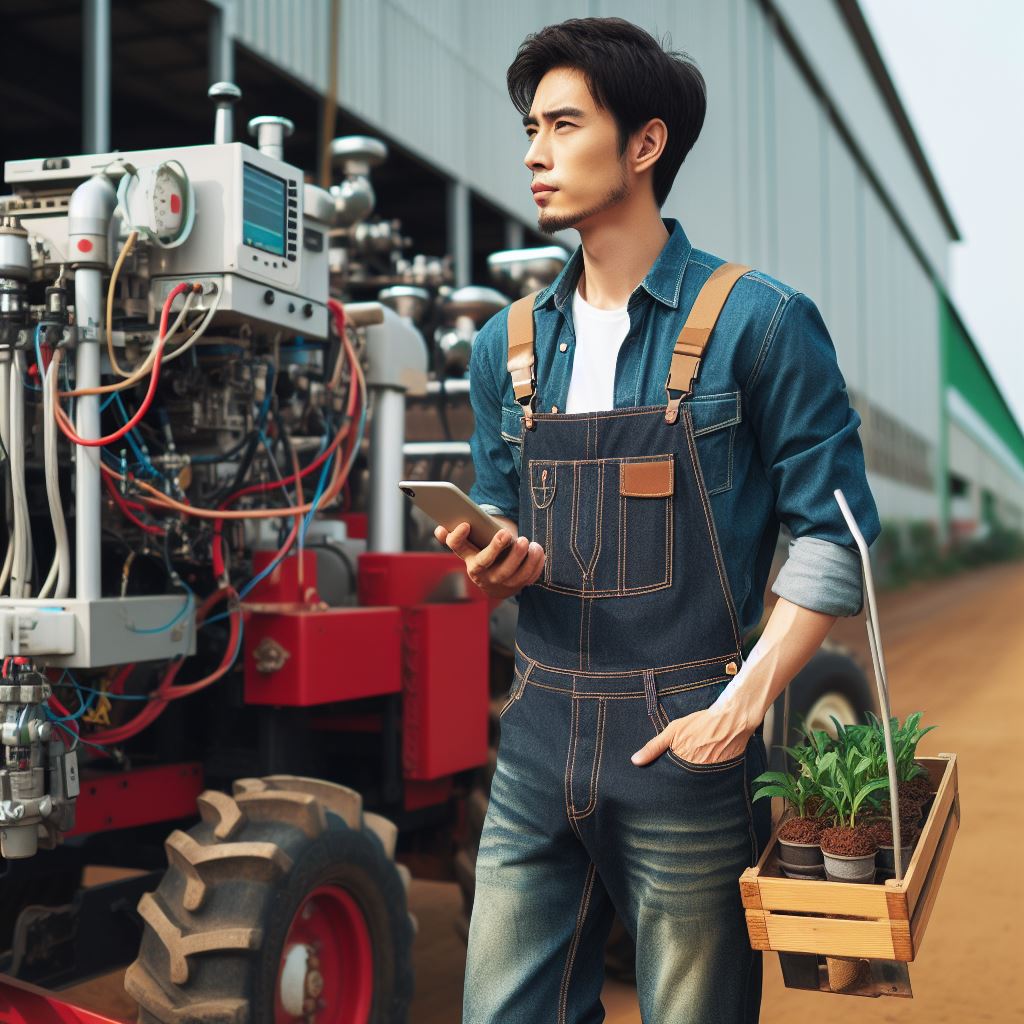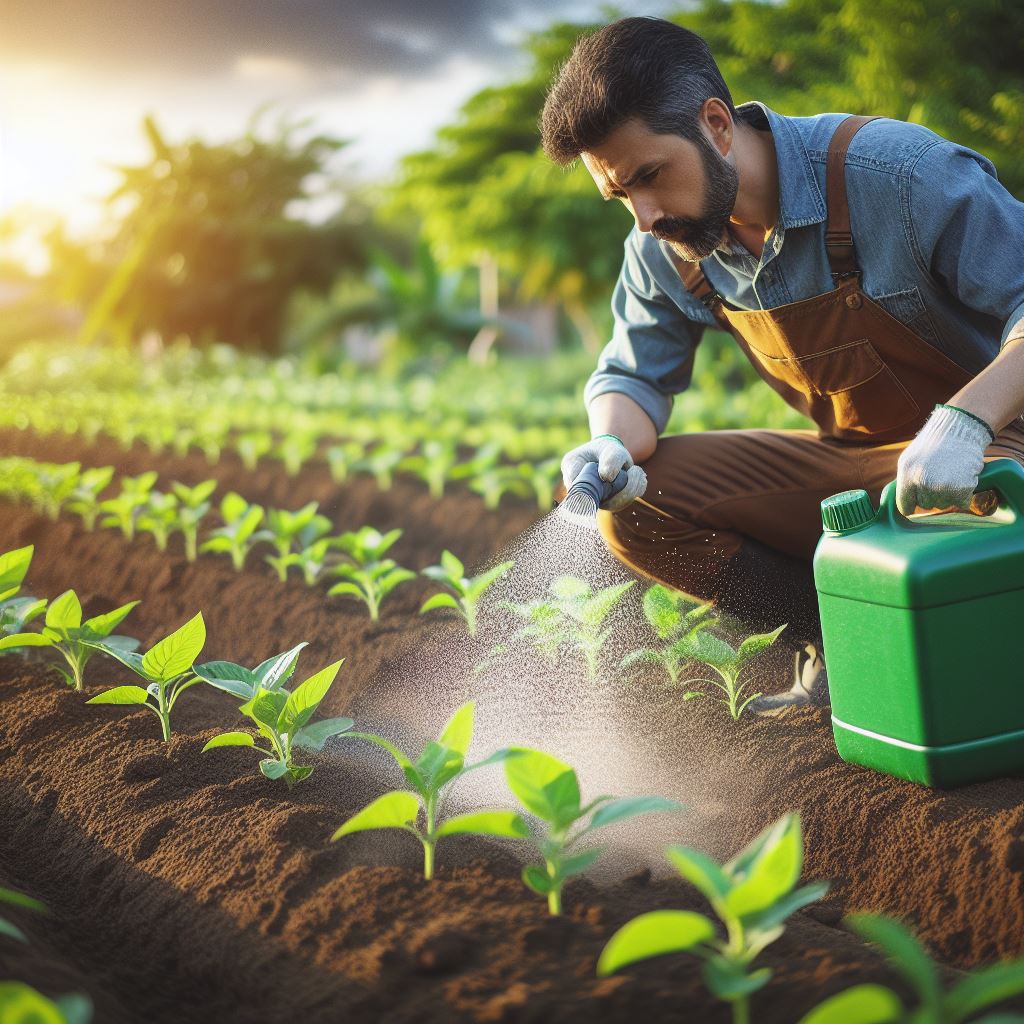Introduction
Modern farm equipment has revolutionized the way farmers carry out their daily activities.
These advanced machines, characterized by cutting-edge technology and automation, have drastically improved the efficiency and productivity of the agriculture industry.
Gone are the days when farmers heavily relied on manual labor and traditional tools.
The introduction of modern farm equipment has significantly reduced the time and effort required for various tasks, such as planting, harvesting, and irrigation.
With the help of these machines, farmers can now cover larger areas of land in a shorter period, efficiently meeting the ever-growing demand for food.
Moreover, modern farm equipment has also contributed to the overall sustainability of agriculture.
These machines are designed to optimize the use of resources like water, fertilizers, and pesticides.
They are equipped with sensors and advanced monitoring systems that enable farmers to apply these inputs precisely, minimizing waste and environmental impact.
Furthermore, the use of modern farm equipment has led to increased precision in farming practices.
GPS technology and sophisticated software allow farmers to precisely plant seeds, apply fertilizers, and control pests.
This precision farming approach not only results in higher crop yields but also minimizes resource wastage and reduces negative environmental effects.
In a nutshell, modern farm equipment has revolutionized agriculture by improving efficiency, productivity, and sustainability.
Its introduction has transformed the way farmers carry out their tasks, enabling them to meet the demands of a growing population while minimizing environmental impact.
As technology continues to advance, it is essential for the agriculture industry to embrace and integrate modern farm equipment for a more sustainable and productive future.
Advancements in Technology
In recent years, the agricultural landscape has witnessed a significant transformation due to advancements in technology.
These advancements have revolutionized the way farmers operate, increasing productivity, reducing labor requirements, and optimizing resource utilization.
This section explores three key areas where modern farm equipment has made a profound impact:
integration of precision agriculture, automation and robotics in farming, and advancements in sensors and data collection.
Integration of precision agriculture
Precision agriculture involves the use of technology to manage and analyze agricultural data, allowing farmers to make informed decisions and adopt targeted farming practices.
One of the critical components of precision agriculture is the integration of GPS (Global Positioning System) and GIS (Geographic Information System) technology.
These technologies enable farmers to accurately track and map various factors such as soil composition, nutrient levels, and crop growth.
By precisely analyzing this data, farmers can customize their agricultural practices, leading to significant improvements in yield and resource management.
The benefits of precision agriculture are manifold.
Farmers can now apply fertilizers and pesticides only where they are needed, reducing input costs and minimizing environmental impact.
Additionally, precise irrigation techniques help conserve water resources and prevent water wastage.
By monitoring crop growth in real-time, farmers can identify potential issues such as pest infestations or nutrient deficiencies and take immediate corrective measures.
Ultimately, precision agriculture optimizes the use of resources, increases crop productivity, and promotes sustainable farming practices.
Automation and robotics in farming
The advent of automation and robotics has brought increased efficiency and precision to farming operations.
Drones, equipped with cameras and sensors, are employed for various tasks in agriculture.
They can monitor crops from the air, capturing high-resolution images that help detect crop stress, disease outbreaks, or irregularities in growth patterns.
Drones are also used for precision spraying, delivering fertilizers or pesticides exactly where they are needed.
This targeted approach reduces chemical use, minimizes human exposure, and prevents the spread of contaminants.
Robots have also emerged as valuable assets in farming.
They have been developed to perform labor-intensive tasks such as planting, weeding, and harvesting.
Robotic planters can precisely place seeds in optimal locations, ensuring uniform plant density.
Weeding robots use computer vision and AI algorithms to identify and remove weeds, reducing the reliance on manual labor and herbicides.
Harvesting robots can pick fruits or vegetables with great care and efficiency, minimizing damage and harvest losses.
Automation and robotics not only increase productivity but also alleviate the strain on human labor in the agricultural sector.
Advancements in sensors and data collection
Sensors and data collection systems have become crucial components of modern farm equipment.
Weather stations and soil moisture sensors provide real-time data on temperature, humidity, rainfall, and soil moisture content.
This information helps farmers make informed decisions about irrigation schedules, fertilizer application, and pest management.
Additionally, data-driven decision making allows farmers to identify trends, patterns, and anomalies in crop growth, enabling timely interventions for optimal crop health and productivity.
Farmers can also access historical data to analyze long-term trends and predict future challenges, improving planning and risk management.
In review, modern farm equipment, driven by advancements in technology, has revolutionized the agricultural landscape.
The integration of precision agriculture, automation and robotics, and advancements in sensors and data collection have significantly improved productivity, resource management, and decision-making in farming.
As technology continues to evolve, farmers can expect further innovations that will further enhance their efficiency and sustainability.
Read: Climate Impact on Potato Growth: What to Know
Increased Efficiency and Productivity
The advent of modern farm equipment has brought about significant changes in the agricultural landscape, leading to increased efficiency and productivity.
This section discusses the various benefits that arise from the use of such equipment, from time-saving advantages to enhanced crop monitoring and management.
Time-saving benefits of modern farm equipment
One of the most significant advantages of using modern farm equipment is the reduction in manual labor.
Tasks that used to require a lot of human effort can now be efficiently accomplished with the help of machinery.
This not only saves time but also reduces the physical strain on farmers.
Transform Your Agribusiness
Unlock your farm's potential with expert advice tailored to your needs. Get actionable steps that drive real results.
Get Started
Additionally, modern equipment allows for increased speed and accuracy in performing tasks.
For example, plowing a large field would take considerable time and effort when done manually. With a modern tractor, this task can be completed much faster and with greater precision.
As a result, farmers can accomplish more in a shorter amount of time.
Optimization of inputs
Another key benefit of modern farm equipment is the optimization of inputs.
Precise fertilizer application is made possible through the use of advanced machinery.
Sensors and computer systems enable farmers to apply the right amount of fertilizer to each crop, ensuring optimal growth.
This not only improves crop health but also reduces wastage and potential environmental impacts.
Similarly, modern equipment allows for targeted pest control methods.
Rather than applying pesticides indiscriminately, machinery can be used to precisely target affected areas.
This reduces the overall use of chemicals while effectively combating pests and minimizing the risk of resistance development.
Farmers can protect their crops without unnecessary harm to the environment.
Improved crop monitoring and management
Modern farm equipment offers advanced technologies for crop monitoring and management.
Real-time data collection and analysis provide valuable insights into crop health.
Sensors in the field can measure moisture levels, nutrient content, and other vital parameters.
This allows farmers to assess the status of their crops accurately and make informed decisions regarding watering, fertilization, and other necessary interventions.
In addition, the use of modern equipment enables early identification and mitigation of potential issues.
With real-time data at their disposal, farmers can quickly detect any signs of disease, pest infestation, or other problems.
Prompt action can be taken to prevent further spread and minimize crop losses.
By leveraging technology, farmers can proactively manage their crops and protect their yields.
In closing, modern farm equipment brings numerous benefits to the agriculture industry, specifically in terms of efficiency and productivity.
Time-saving benefits, optimization of inputs, and improved crop monitoring and management all contribute to better farming practices.
As technology continues to advance, these advantages will further transform the agricultural landscape, ensuring a sustainable and prosperous future for farmers.
Read: Organic Fertilizers: Boosting Soil Health

Enhanced Sustainability
Conservation of resources
Reduced fuel consumption and emissions
In today’s modern agricultural landscape, farm equipment plays a crucial role in enhancing sustainability by conserving resources.
One significant aspect is the reduced fuel consumption and emissions.
With the introduction of advanced machinery, farmers can now achieve higher levels of productivity while simultaneously reducing their reliance on fossil fuels.
This results in a significant decrease in overall fuel consumption and contributes to the reduction of harmful emissions, promoting a greener and cleaner agricultural environment.
Efficient water management practices
Another essential factor in enhancing sustainability is efficient water management practices.
By utilizing modern farm equipment, farmers can implement precision irrigation techniques that optimize water usage.
This ensures that crops receive an adequate amount of water while minimizing wastage.
Efficient water management not only conserves this valuable resource but also contributes to increased crop yields and reduces the strain on water sources.
Integration of sustainable practices
Precision planting and reduced seed waste
The integration of sustainable practices into modern farm equipment has led to precise planting techniques, reducing seed waste.
This is achieved through advanced technologies that enable farmers to plant seeds with exact spacing and depth.
By minimizing seed waste, farmers can achieve higher crop productivity while preserving valuable resources.
Adoption of cover crops for soil health
Modern farm equipment has also facilitated the adoption of cover crops for maintaining soil health.
Cover crops are planted to protect the soil from erosion, improve soil structure, and enhance nutrient retention.
With the assistance of specialized equipment, farmers can easily plant and manage cover crops, ensuring the long-term sustainability of their land and maximizing its productivity.
Decreased chemical usage and environmental impact
Precision spraying techniques
One significant advancement in modern farm equipment is the implementation of precision spraying techniques.
This enables farmers to apply pesticides and herbicides with pinpoint accuracy, reducing chemical usage.
By targeting specific areas, farmers can minimize the negative impact on beneficial insects and the surrounding environment.
Precision spraying not only promotes sustainable farming practices but also helps maintain a healthy ecosystem.
Implementation of integrated pest management strategies
Farmers have also adopted integrated pest management strategies with the aid of progressive farm equipment.
Integrated pest management involves a combination of techniques to prevent and control pests effectively.
By utilizing equipment that allows for real-time monitoring and precise application of pest control measures, farmers can reduce the overall use of chemicals.
This approach helps preserve biodiversity, protect natural resources, and maintain long-term environmental sustainability.
Basically, modern farm equipment has revolutionized the agricultural landscape by enhancing sustainability.
Through the conservation of resources, integration of sustainable practices, and decreased chemical usage, farmers can optimize productivity while minimizing environmental impact.
By embracing these advancements, agriculture can progress towards a more sustainable and eco-friendly future.
Read: Irrigation Methods for Rice: Maximizing Yield
Challenges and Limitations
Initial costs and investments required for modern farm equipment
- Modern farm equipment is often expensive, making it a significant financial investment for farmers.
- The cost of purchasing and maintaining modern farm equipment can be a barrier for many farmers.
- Farmers may need to secure loans or financing options to afford the initial investment in modern equipment.
- High initial costs can limit the adoption of modern farm equipment, especially for small-scale farmers.
Technological barriers and limited access in certain regions
- Modern farm equipment relies on advanced technology, which may not be readily available in all regions.
- Remote or underdeveloped areas may lack the necessary infrastructure to support the use of modern equipment.
- Limited access to high-speed internet, electricity, or reliable power sources can hinder the use of advanced equipment.
- Technological barriers can prevent farmers from fully benefiting from the efficiency and productivity gains offered by modern equipment.
Training and education for farmers to optimize equipment usage and maintenance
- Modern farm equipment often requires specialized knowledge and skills to operate and maintain effectively.
- Farmers need to undergo training and education programs to learn how to use modern equipment safely and efficiently.
- Lack of access to training resources can limit farmers’ ability to maximize the potential benefits of modern equipment.
- Continuous education and support are necessary to keep up with advancements in technology and equipment updates.
- Providing farmers with the necessary training and education can ensure that equipment is used optimally, reducing the risk of accidents or damage.
In short, while modern farm equipment offers numerous benefits, it also presents various challenges and limitations.
The high initial costs and investments required can be a financial burden for farmers, especially those with limited resources.
Technological barriers and limited access to infrastructure can hinder the widespread adoption of modern equipment.
Additionally, training and education are crucial for farmers to fully optimize the usage and maintenance of modern equipment.
By addressing these challenges and providing support to farmers, the agricultural industry can harness the full potential of modern farm equipment and contribute to a more efficient and sustainable ag landscape.
Read: Pest Control in Corn Fields: Effective Strategies
Future Perspectives
Continued advancements in technology
The future of modern farm equipment is expected to bring even more advancements in technology.
Artificial intelligence and machine learning integration will revolutionize farming practices, allowing for more efficient and precise operations.
With the help of AI and ML, farmers will be able to analyze data collected from various sensors, cameras, and other devices in real-time to make better decisions about crop management, irrigation, and pest control.
The Internet of Things (IoT) will also play a significant role in the future of farm equipment.
IoT devices will enable seamless connectivity between different agricultural machinery and equipment, allowing for the efficient transfer of data.
This connectivity will enable farmers to have a better understanding of their farm’s overall performance and make data-driven decisions to optimize their operations.
Integration of autonomous farming systems
The integration of autonomous farming systems will further revolutionize the agricultural landscape.
Driverless tractors and equipment will eliminate the need for manual labor, making farming operations more cost-effective and efficient.
These autonomous systems will be equipped with advanced sensors and GPS technology to navigate fields and perform tasks such as planting, fertilizing, and harvesting with precision.
Smart farming systems will also become increasingly popular in the future.
These systems will enable farmers to remotely monitor and control various aspects of their farm, including irrigation, temperature, humidity, and soil moisture.
With real-time data at their fingertips, farmers will be able to optimize resource allocation and ensure optimal conditions for their crops.
Collaboration between equipment manufacturers and farmers for customized solutions
The future of modern farm equipment will rely heavily on collaboration between equipment manufacturers and farmers.
This collaboration will result in the development of customized solutions that address specific farm needs and challenges.
Equipment manufacturers will work closely with farmers to understand their requirements and develop specialized machinery and equipment.
These customized solutions may include equipment modifications, software integration, and personalized training to ensure that farmers can maximize the benefits of modern farm technology.
By collaborating with manufacturers, farmers will have access to cutting-edge technology tailored to their specific farming practices.
This partnership will drive innovation and lead to the development of more efficient and sustainable agriculture practices.
Showcase Your Farming Business
Publish your professional farming services profile on our blog for a one-time fee of $200 and reach a dedicated audience of farmers and agribusiness owners.
Publish Your ProfileIn general, the future of modern farm equipment is bright.
Continued advancements in technology, such as artificial intelligence, machine learning, and IoT, will bring about significant improvements in farming practices.
The integration of autonomous farming systems will further enhance efficiency and productivity.
Collaboration between equipment manufacturers and farmers will result in customized solutions that address specific needs and challenges.
Together, these developments will shape the future of agriculture and lead to a more sustainable and productive farming landscape.
Conclusion
Modern farm equipment stands as a transformative force in agriculture, shaping the landscape significantly.
- Significance Recap: The impact is undeniable, increasing productivity, efficiency, and economic returns for farmers.
- Call to Action: Farmers must actively embrace and adapt to ongoing technological advancements for sustained success.
- Adaptability Key: The evolving agricultural landscape demands adaptability for farmers to thrive in a competitive industry.
- Training and Education: Seek training and education to harness the full potential of modern farming technologies.
- Collaboration Opportunities: Explore collaborations with technology providers and industry experts for seamless integration on farms.
- Sustainability Focus: Consider the environmental impact and prioritize sustainable practices in the adoption of modern equipment.
- Future Prospects: The future holds promise, with ongoing innovation and continuous positive transformation in the agriculture industry.
- Strategic Decision-Making: Leverage data-driven insights for strategic decision-making, optimizing resources, and minimizing environmental impact.
- Economic Edge: Embracing technological advancements provides a competitive edge, ensuring economic viability and long-term sustainability.
In summary, the journey toward a technologically advanced agricultural future is both exciting and necessary.
By recapitulating the transformative role of modern farm equipment, issuing a resounding call to action, and contemplating future prospects, this section underscores the pivotal role of technology in securing the future of agriculture.
Farmers, as the stewards of the land, are urged to navigate these changes actively, ensuring a resilient and thriving agricultural sector for generations to come.




